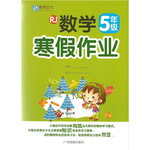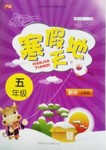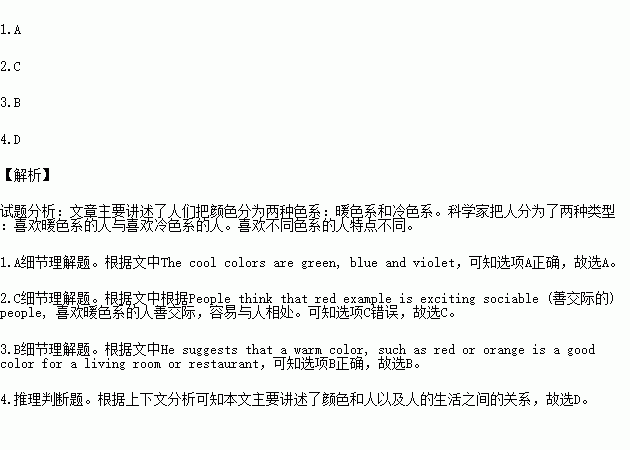题目内容
In general, people talk about two groups of colors: warm colors and cool colors. Researchers in psychology think that there are also two groups of people: people who prefer warm colors and people who prefer cool colors.
The warm colors are red, orange and yellow. Where there are warm colors and a lot of light, people usually want to be active. People think that red, for example, is exciting. Sociable people, those who like to be with others, like red. The cool colors are green, blue and violet. These colors, unlike warm colors, are relaxing. Where there are cool colors, people are usually quiet. People who like to spend time alone often prefer blue.
Red may be exciting, but one researcher says that time seems to pass more slowly in a room with warm colors than in a room with cool colors. He suggests that a warm color, such as red or orange is a good color for a living room or restaurant. People who are relaxing or eating do not want time to pass quickly. Cool colors are better for offices or factories if the people who are working there want time to pass quickly. Researchers do not know why people think some colors are warm and other colors are cool.
However, almost everyone agrees that red, orange, and yellow are warm and that green, blue, and violet are cool. Perhaps warm colors remind people of warm days and the cool colors remind them of cool days. Because in the north the sun is higher during summer, the hot summer sunlight appears yellow.
1.Which of the following colors belong to cool colors?
A. Blue, violet B. Yellow, green
C. Black, blue. D. Brown, white
2.Which of the following statements is not true?
A. Sociable people like warm colors.
B. Warm colors can make people excited.
C. People who like to be with others don’t like red.
D. Where there are warm colors, people want to be active.
3.Which is the right color for different rooms?
A. Red or orange for offices.
B. Orange for dining rooms.
C. Blue for bedrooms.
D. Red for studies
4. Which of the following is the best title for the passage?
A. Two groups of colours B. Cool colours
C. Warm colours D. Colours and people
 黎明文化寒假作业系列答案
黎明文化寒假作业系列答案 寒假天地重庆出版社系列答案
寒假天地重庆出版社系列答案
